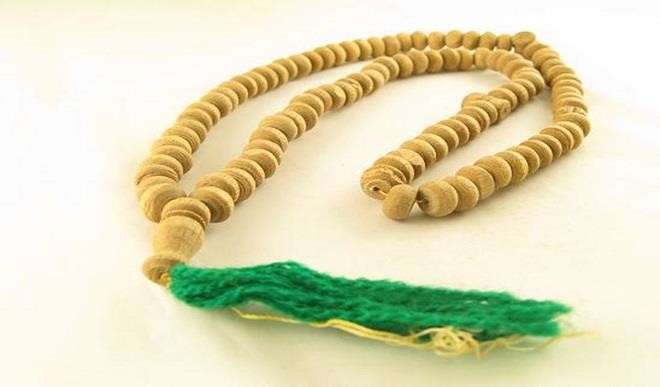
Islamic prayer beads are called subha, from a word which means to glorify Allah (SWT). The verbs tasbih or tasbeeha which describe the use of the beads, are also used as their name.
Also known as misbaha, dhikr beads or worry beads, subha is used by Muslims to help count recitations and concentrate during personal prayers. The worshipper touches one bead at a time while reciting words of dhikr (remembrance of Allah). These recitations are often of the 99 “Names” of Allah, or of phrases that glorify and praise Allah. These phrases are most often repeated as follows:
• Subhannallah (Glory to Allah) – 33 times
• Alhamdilillah (Praise be to Allah) – 33 times
• Allahu Akbar (Allah is Great) – 33 times
This form of recitation stems from an account (hadith) in which the Prophet Muhammad (peace be upon him) instructed his daughter, Fatima, to remember Allah using these words.
He also said that believers who recite these words after every prayer “will have all sins pardoned, even if they may be as large as the foam on the surface of the sea.”
Muslims may also use prayer beads to count multiple recitations of other phrases while in personal prayer.
Some Muslims hang prayer beads in the home, or near young babies, in the mistaken belief that the beads will protect from harm. Blue beads which contain an “evil eye” symbol are used in similar superstitious ways that have no basis in Islam. Prayer beads are also often carried by performers who swing them around during traditional dances. These are cultural practices with no basis in Islam.
At the time of the Prophet Muhammad, Muslims did not use prayer beads as a tool during personal prayer, but may have used date pits or small pebbles. Reports indicate that Caliph Abu Bakr (may Allah be pleased with him) used a subha similar to modern ones.
The widespread manufacture and use of subha began about 600 years ago.
There are Muslims who see the subha as an unwelcome innovation. They argue that the Prophet Muhammad (pbuh) himself did not use them, and they are an imitation of ancient prayer beads used in other religions and cultures. As an alternative, some Muslims use their fingers alone to count recitations. Beginning with the right hand, the worshipper uses the thumb to touch each joint of each finger. Three joints on a finger, over 10 fingers, results in a count of 33.
– islam.about.com

 Join Daily Trust WhatsApp Community For Quick Access To News and Happenings Around You.
Join Daily Trust WhatsApp Community For Quick Access To News and Happenings Around You.


